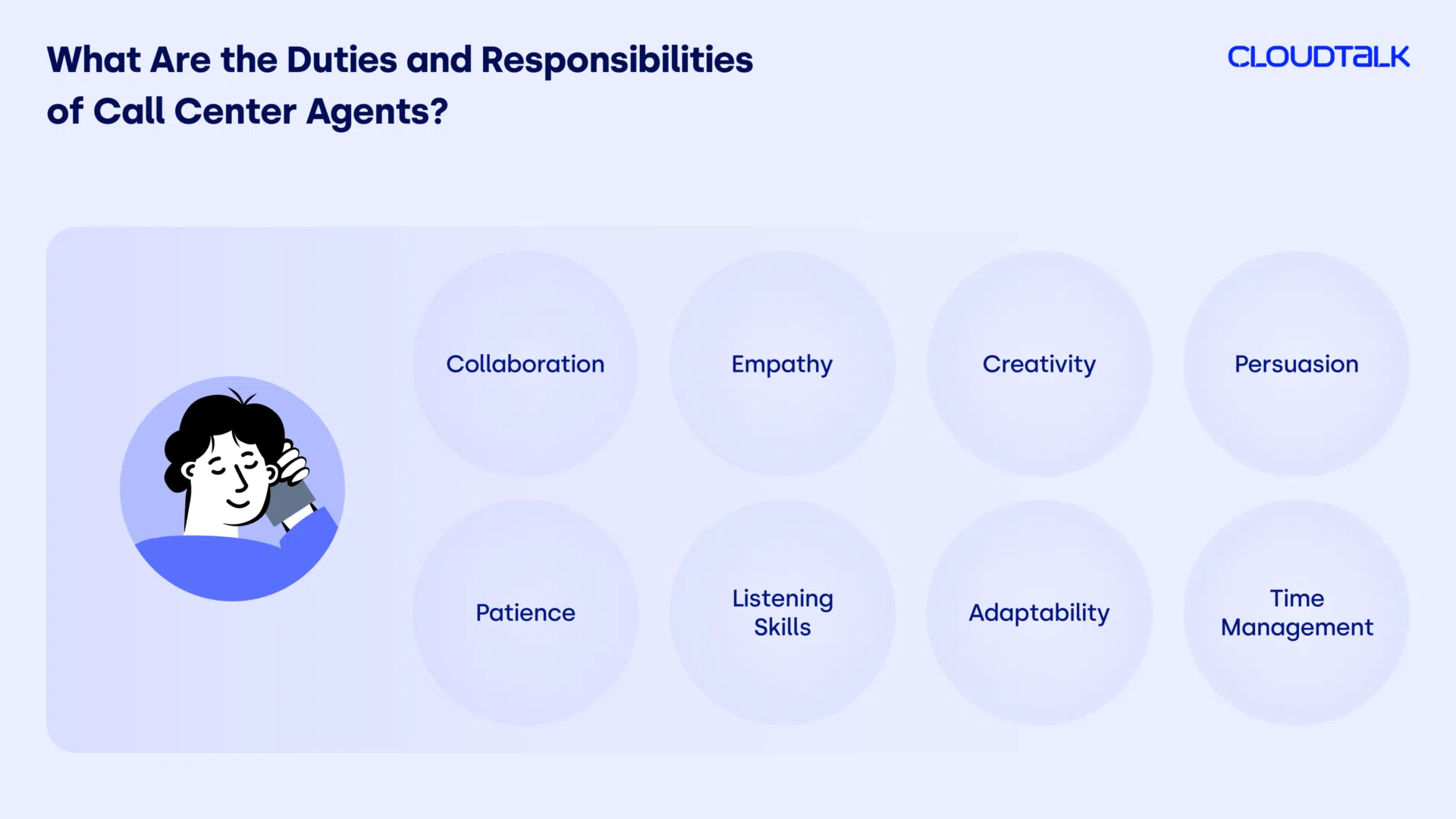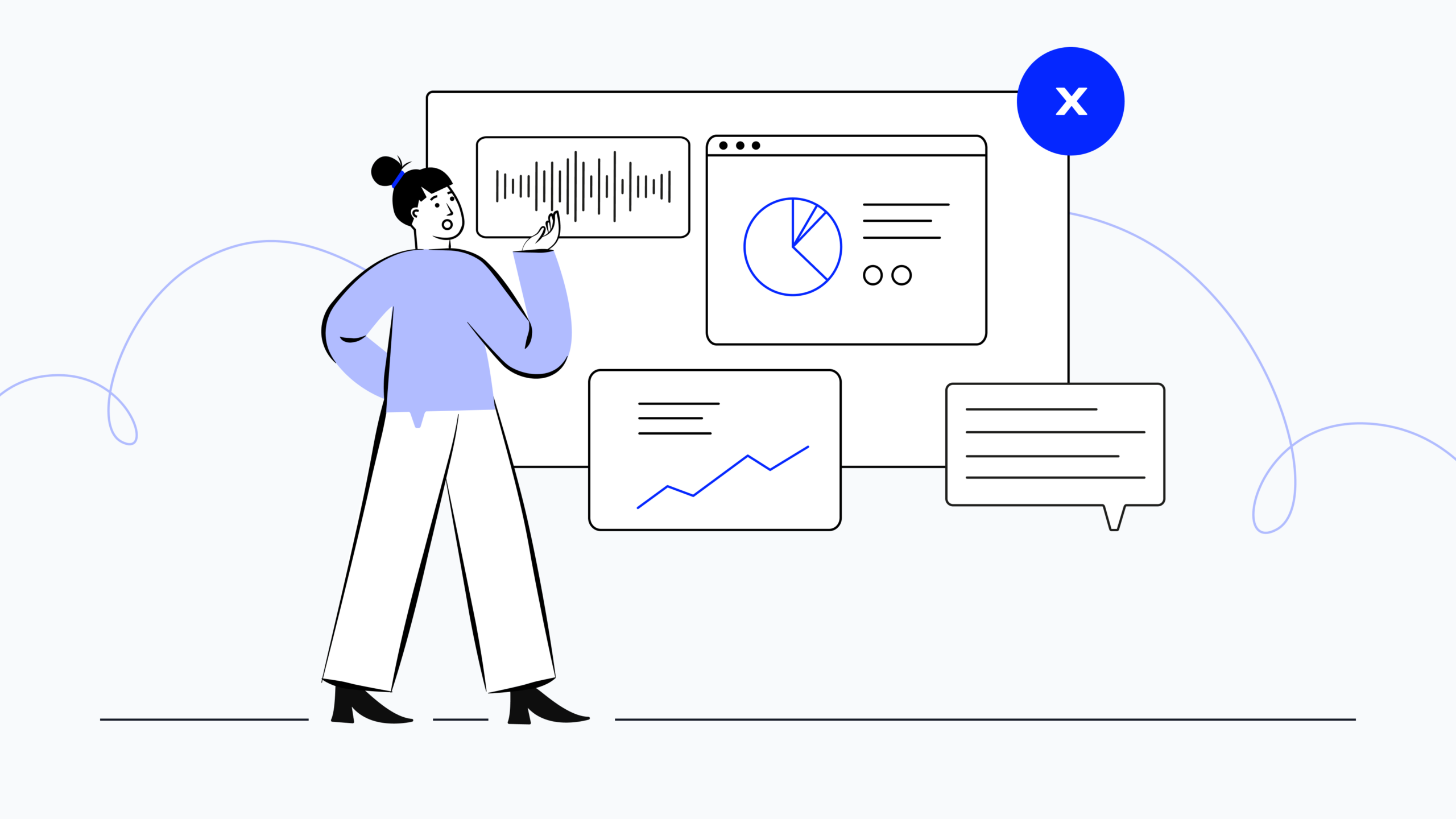A call center agent isn’t just a voice on the other end of the line—they’re the face of your brand, the fixer of problems, and often the driving force behind customer loyalty.
Whether handling billing questions, resolving complaints, or offering product recommendations, call center agents are at the core of every customer-centric business.
From handling billing issues to resolving complaints or recommending products, agents sit at the heart of every customer-centric business. Their role is broad but focused on one goal: delivering a smooth, helpful experience—something 75% of customers are willing to pay more for.
Knowing what a call center agent does, and what makes them great, is essential if you’re hiring, training, or stepping into the role yourself. And in 2026, the job involves more than ever: multitasking across platforms, mastering new tools, and hitting performance KPIs.
In this guide, we’ll break down exactly what call center agent duties and responsibilities are, the skills they need, and how the role is evolving. Whether you’re a manager building a team or an agent planning your next move, you’ll get the insights you need.
Key Takeaways:
-
Call center agents are the gateway to customer experience—their performance directly impacts loyalty and retention.
-
Success comes from a mix of core call center agent responsibilities (like resolving issues and following up) and soft skills such as empathy, resilience, and clear communication.
-
Modern agents need tools that streamline multichannel support, automate repetitive tasks, and keep customer data organized for faster, more personal service.
-
With the right mindset and technology, agents can transform routine calls into opportunities that strengthen relationships and drive business growth.
-
CloudTalk equips agents with features like real-time customer cards, smart dialers, and CRM integrations—so every call is faster, easier, and more effective.
What is a Call Center Agent?
A call center agent, also referred to as a call center representative, a customer service representative (CSR), or a contact center agent is a person who handles customer calls on behalf of a business. These calls can be about anything—questions, problems, purchases, or follow-ups.
Agents are often the first human connection customers have with a company. That makes them crucial in shaping how people feel about the brand.
They don’t work alone. Agents use software that helps them log details, track issues, and keep every interaction on record. Think of it like a digital command center. They may work in a traditional call center or from home in a remote setup.
Whether it’s solving an issue or closing a sale, the agent’s goal is simple: help the customer, clearly and efficiently. That’s what makes the role so valuable.
Equip Your Agents to Handle Every Call with Confidence
Inbound vs. Outbound: How Call Center Agents Support Customers
Call center agents support customers in two key ways: by responding to incoming requests or reaching out directly. These are known as inbound and outbound calls—and each comes with its own set of tasks.
Inbound calls
Inbound calls are those calls that customers make in order to ask for assistance. Call center agents answer their questions, solve issues, assist with orders, and more. In short, agents make sure that any customer’s inquiry is resolved or is in the process of being resolved.
Outbound calls
Generally, this term refers to call center agents contacting customers with the intention to offer a product or service. Some may know it as cold calling. Though, sales are not the only purpose of outbound calls. Agents can also follow up with clients to make sure all their past issues were successfully handled and if not, offer further assistance.
Power Up Your Frontline with the right tools—Give Customers a Reason to Come Back

9 Core Duties and Responsibilities of Call Center Agents
Call center agents wear many hats—problem solvers, salespeople, support heroes, and process guardians. Their work goes far beyond simply picking up the phone. Whether handling inbound requests, outbound outreach, or internal workflows, each responsibility plays a key role in shaping the customer experience.
Here are 9 essential duties that define a modern call center agent’s role.
1. Processing Payments and Orders (Inbound)
One of the core tasks for inbound agents is helping customers complete or manage transactions. This includes resolving payment issues, handling returns, updating shipping information, or even placing orders directly on the customer’s behalf.
It’s especially important in e-commerce, where agents need a clear understanding of the company’s products and policies to guide customers through every step of the purchase process.
2. Dealing with Complaints (Inbound)
No one loves complaints—but skilled agents know how to turn them into opportunities. Handling dissatisfied customers with empathy, patience, and clear communication can prevent churn and even build long-term loyalty.
That means staying calm under pressure, asking the right questions, and providing fast, concrete solutions without making excuses.
Quick Tips for Handling Difficult Customers
– Understand behavior types: Knowing who you’re dealing with helps tailor your tone.
– Ask the right questions: Clarify the problem before solving it.
– Lead with empathy: A respectful, human tone goes a long way.
– Offer clear solutions: Avoid excuses—get straight to the fix.
3. Handling Multichannel Interactions (Inbound)
Today’s agents often switch between phone, email, live chat, or social messaging—all in one shift. Being able to support customers seamlessly across these channels is now a must.
It requires not just communication skills, but also the ability to juggle multiple platforms, keep records consistent, and maintain a consistent tone and quality of service throughout.
4. Follow-up Calls (Outbound)
When a customer issue can’t be resolved on the first call—or needs confirmation afterward—agents are expected to follow up. This could mean checking whether a refund was received, confirming delivery status, or continuing a complex tech troubleshooting process.
Follow-ups show the customer you care, and they often turn into relationship-building touchpoints.
5. Selling, Upselling and Cross-selling (Outbound)
Outbound agents are often tasked with driving revenue by reaching out to prospects or re-engaging existing customers. That includes cold calling, but also personalized offers based on customer data.
Upselling means offering a better version of what the customer already has. Cross-selling involves recommending complementary services. When done well, it’s a win-win for both business and buyer.
Quick Tips for Making Outbound More Efficient
6. Market Research (Outbound)
Agents also collect valuable insights through outbound calls—whether it’s gauging interest in a product, surveying customer satisfaction, or testing reactions to a new feature.
This kind of data helps businesses shape smarter strategies, prioritize product development, and stay competitive.
7. Updating Databases (On-site)
Call center work generates a lot of data—and it needs to be organized. Agents log call outcomes, customer preferences, interaction history, and contact info in CRM (Customer Relationship Management) or helpdesk systems.
Keeping this data clean and current ensures smoother future interactions and supports personalized service at scale.
Quick Tip for Process Automation
8. Reporting Roadblocks and Issues (On-site)
Because agents are on the front lines, they’re often the first to spot recurring problems—whether it’s a glitch in the product, a confusing policy, or an uptick in a specific complaint.
Flagging these patterns to managers or product teams helps the entire company act faster and smarter.
9. Adhering to KPIs and Compliance Standards (General)
Call center agents work in a performance-driven environment. They’re measured by metrics like average handling time (AHT), customer satisfaction score (CSAT), and first call resolution (FCR).
At the same time, they must follow data privacy rules and industry regulations—like GDPR, HIPAA, or PCI compliance, depending on the business type. Mastering these expectations is part of being a high-performing agent today.
Loyal Customers Start With Empowered Agents
Essential Skills and Qualifications for Call Center Agents
Customers’ success drives business success—and call center agents sit at the center of that relationship. When service falls short, customers are more likely to leave, making every interaction critical for retention and loyalty.
So, what qualifications and skills should an ideal call center agent have?
Here are a few must-haves and nice-to-haves listed in a majority of call center agent job descriptions:
Qualification
Qualification – must-have
Most of the time, the required education is a high school diploma. It’s possible to get in without it, but the chances are lower. If the role is in the finance industry, employers can also ask for a state exam.
Qualification – nice-to-have
In most cases, a university diploma is not required. Yet, in order for agents to reach higher positions, a bachelor’s degree (or higher) in communications, business management or related fields is highly valued.
Skills – must-have
Top-class communication skills
Strong communication is the foundation of every successful call center interaction. Beyond product knowledge, great agents know how to listen, understand the issue, and clearly explain solutions in a way that builds trust and loyalty.
Clear written communication
Some may ask why agents need to be good writers. Many companies offer multi-channel support operated by real people. It means that an agent can be assigned to handle chat or email. Of course, the agent doesn’t have to be a bestselling author. It’s enough to write clearly and with proper grammar. Experience in writing essays for money can often translate into sharper written communication skills, which are essential in delivering clear and professional customer support. Experience in writing essays for money can often translate into sharper written communication skills, which are essential in delivering clear and professional customer support.
Problem solving
Agents can answer as many as 50 calls per day on average. That’s why they have to be effective problem solvers. They must quickly find the root of an issue and come up with the most appropriate solution. Thus, a call center agent has to be both an analytical genius and a creative soul all at once.
Eye for detail
Attention to detail can make or break a customer relationship. No one likes repeating themselves, and that’s why tools like CloudTalk’s Real-Time Customer Card are so powerful. Agents instantly see a customer’s past interactions, purchase history, and notes before they even pick up the call.
Having context at your fingertips not only makes conversations smoother but also shows customers you value their time and loyalty. Pair this with CRM integrations and agents can deliver truly personalized support without switching tools.
How to use it in practice:
”Last time we were calling, you also reported an issue with billing. Is that all right now?”
“I noticed that your company started to expand abroad. As you may soon have a global presence, you can benefit from our international numbers tool. Are you interested in hearing more?”
Time management
A job in a call center can be chaotic from time to time. It’s very important that agents can organize their duties, make a detailed to-do list and know how to multitask in order to meet quotas. Especially in hybrid or remote settings where self-management is essential.
A team player attitude
It makes sense to assume that a call center job is more about the synergy between customers than synergy between team members. It’s not really the case. Call center agents have to work smoothly as a team in order to complement each other’s duties. For example, each agent must know exactly where to route a specific call. It’s also good to be proactive and make notes of each customer interaction, in case another agent will communicate with the same person.
Skills – nice-to-have
Previous experience with a call center agent role
It sounds like something all agents should have. Although it does give the applicant a competitive edge, many times it’s actually not a requirement.
A tech-savvy spirit
Not every agent has to be a certified computer scientist. It’s often enough to be able to handle basic telephony and CRM software, although this may not apply to roles concerning heavily technical products or services.
An ability to speak several languages
Not necessarily a requirement, but a great advantage. Multinational businesses need multilingual customer service. Having call center agents that speak more than one language is a great advantage.
How to Be a Great Call Center Agent
We’ve already covered duties, responsibilities, and qualifications. But becoming a truly great call center agent requires more than just knowledge—it’s about mindset and personality traits.
Key traits of great call center agents:
-
Projecting confidence: Customers trust agents who sound credible and sure of their solutions. Confidence makes people more likely to accept help—or even buy.
-
Resilience: Outbound calls often face rejection. Strong agents stay motivated and keep trying without letting failure affect their performance.
-
Motivation by customer success: The best agents are driven by helping others. Patience, empathy, and determination ensure customers feel supported.
-
Proactivity: Going beyond the basics—like offering a voucher for a mistake or free shipping after a delay—turns good service into memorable service.
-
Stable performance under pressure: Great agents don’t let stress or heated conversations affect their professionalism. They remain calm and effective under pressure.
3 bonus tips to boost performance:
-
01
Make it personal: It’s important that customers feel like they are talking to a human being, not a machine. Each interaction should start with an introduction from both sides. That’s a great way to kickstart a nice, friendly chat. Throughout the conversation, agents should refer to the customers by their names.
-
02
Keep things light and breezy: No matter what happens, at the end of the day, agents should enjoy their job. Having fun talking to customers and building strong connections essential for a well performing agent.
-
03
Take a break: Physical and mental breaks are very important. The whole day on the phone lines can be a real energy drainer. Without breaks, agents never switch off. A nice walk or a short break to focus on themselves can do wonders for their performance.
A Brief Overview of the Call Center Manager Role
All call center agents have the potential to grow if they perform exceptionally well. Let’s go through the basics of what a managerial position in a call center looks like.
What are call center managers dealing with and what makes them great?
What Are the Duties and Responsibilities of Call Center Managers?
The duties of all center managers don’t differ much from those of other managerial positions.
Here is a list of the most crucial ones:
-
Building teams out of the most qualified agents
-
Onboarding and training of new hires
-
Leading team meetings
-
Work towards improving customer satisfaction
-
Supporting a productive environment and smooth processes
-
Resolving potential issues
-
Managing shifts based on availability and compatibility
-
Analyzing data and providing reports to upper management
-
Overseeing, evaluating, and boosting the performance of their agents
What Makes a Great Call Center Manager?
Having the title isn’t enough. An exceptional call center manager needs a specific set of abilities.
These include:
-
Extraordinary communication skills
-
High-level people skills
-
Detailed company and product/service knowledge
-
Technical knowledge of all systems the call center uses
-
Great logical and logistical thinking
-
Understanding of how to measure call center performance
-
Project management skills
How Much Money Does a Call Center Representative Make
Of course, there’s no unified answer. We put together a table with average base salaries from 16 countries worldwide.
| Country | Local Currency (per year) | Euro Equivalent (per year) | USD Equivalent (per year) |
|---|---|---|---|
| USA | $42,279 (USD) | €41,565 | $42,279 |
| Canada | $48,858 (CAD) | €37,122 | $37,755 |
| Great Britain | £26,447 (GBP) | €31,376 | $31,915 |
| Germany | €37,701 (EUR) | €37,701 | $38,356 |
| France | €28,278 (EUR) | €28,278 | $28,769 |
| Spain | €23,482 (EUR) | €23,482 | $23,890 |
| Portugal | €19,246 (EUR) | €19,246 | $19,580 |
| Italy | €25,619 (EUR) | €25,619 | $26,064 |
| Netherlands | €34,981 (EUR) | €34,981 | $35,588 |
| Slovakia | €14,858 (EUR) | €14,858 | $15,116 |
| Sweden | 352,437 kr (SEK) | €33,974 | $34,580 |
| Philippines | ₱248,456 (PHP) | €4,392 | $4,469 |
| India | ₹3,33,972 (INR) | €4,129 | $4,205 |
| Brazil | R$46,960 (BRL) | €8,898 | $9,064 |
| Colombia | $21,672,268 (COP) | €4,928 | $5,021 |
| Mexico | $152,646 (MXN) | €7,351 | $7,487 |
Call Center Job Description Example
To finish this blog on a practical note, we are attaching our very own example of a call center agent job ad:
Call Center Agent
We are searching for a proactive and responsible colleague who likes to socialize and isn’t afraid to pick up the phone. Our new call center agent should be a confident communicator driven by customer success. He or she should be resilient. Last but not least, our ideal candidate shouldn’t be discouraged by a few drawbacks and occasional pressure.
But most of all, we seek a friendly person who can make each customer smile.
You will be responsible for:
-
Answering customers’ questions and providing help with their inquiries
-
Following up with customers and making sure all issues are resolved
-
Dealing with complaints
-
Processing payments and orders
-
Conducting occasional market research
-
Reporting potential service/product bottlenecks to management
You should have:
-
Top-class verbal communication skills
-
Good writing skills
-
Talent for solving problems
-
An eye for detail
-
Great time management abilities
-
Team spirit
It’s good if you have:
-
Previous experience working in call centers
-
Experience with calling software and CRM systems
-
An ability to speak more languages – Spanish is a big advantage
Education:
-
High school diploma or equivalent
-
Bachelor in communication, business, management, or a related field is preferred
We offer a competitive salary and great benefits, which we’ll happily disclose during the first interview.
If you like what you’ve just read, please send your resume and cover letter in English to www.XYZ.com.
We are looking forward to speaking with you!
Great Customer Experience Starts with Agents
If there’s one takeaway, it’s this: great call center agents don’t just “handle calls”—they protect loyalty. Every resolved issue, smart follow-up, and accurate note makes the next conversation faster, friendlier, and more profitable.
The teams that win stack the basics with better systems: fewer missed calls, shorter queues, cleaner CRM data, and coaching that actually sticks. That’s where tools like smart routing, real-time context, and automated follow-ups turn good service into repeat business.
If your agents are juggling tabs, guessing context, or chasing updates, that’s not a people problem—it’s a workflow problem. Fix the plumbing, and performance follows.
CloudTalk helps you do exactly that—connecting calls, CRMs, and analytics so agents can focus on what they do best: helping customers. Ready to see the difference in speed, accuracy, and CSAT? Take CloudTalk for a spin and turn every call into a better one.

Turn Agent Duties Into Customer Loyalty

Sources

















